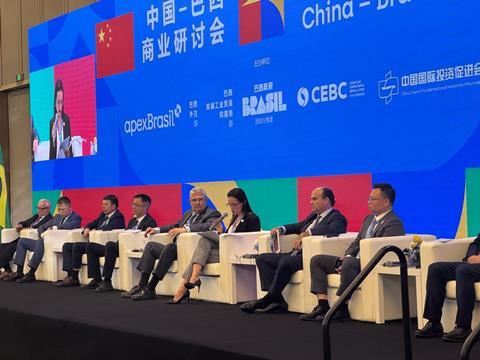Abrafrutas president Guilherme Coelho updates Fruitnet on potential trade breakthroughs in Asia and Europe

Brazilian grape suppliers are ready to send their fruit to China for the first time, possibly before the end of the year, according to the president of the country’s export association Abrafrutas.
Speaking exclusively to Fruitnet on the eve of this week’s trade mission to Beijing and Shanghai, Guilherme Coelho said he expected talks with importers to help clarify various protocols and requirements ahead of a possible market debut.
Brazilian melons have already been granted free trade access to China, while it is expected that the countries’ recent agreement on grapes will also lead to the first commercial shipments within the next six to nine months.
The breakthrough could make a big difference to Brazil’s grape industry, which in theory would be able to supply Chinese customers year-round.
Trade mission
Last November, Coelho met with Chinese president Xi Jinping alongside Brazilian president Luiz Inácio Lula da Silva in Brasilia, where a decision was reached on the Latin American country’s grape exports to China.
And on Tuesday 12 May, he joined more than a hundred business officials in accompanying Lula to Beijing to discuss a further strengthening of trade ties.
“After President Lula returns home, we are going to Shanghai,” he revealed, ”where we will start a conversation with importers of grapes and melons.”
Coelho and his colleagues are scheduled to meet with with importers and retailers, and plan to visit distribution centres and supermarkets in the region.
“Then we will know how they want grape and melon varieties, what packaging they want, when they want it, and a lot of other things,” he explained. “When we finish this mission, we will know exactly what they want.”
Ships are understood to be ready to transport the fruit from the Port of Salvador on a 30-day journey to China.
“Thirty days is a fantastic transit time for grapes and melons,” Coelho suggested. “It’s great news for us to start exporting to a country like China with 1.4bn people. We are looking forward to good things to come here.”
European expansion
Growth in Brazil’s fruit exports to Europe may also be on the cards, should the proposed EU-Mercosur trade agreement be ratified later in 2025.
Two weeks ago, Coelho was in Brussels for meetings with a number of Brazil’s European ambassadors for an update on the negotiations.
“They told us that the negotiation between Mercosur and the EU is going well, and maybe in December they will close this agreement,” he told Fruitnet. “For Brazilian fruit, this will be very, very interesting, because today we pay an import duty.”
On imported grapes, that tax is reckoned to be between 8 and 14 per cent, while for watermelons and melons it’s 10 per cent and for lemons it’s 14 per cent.
“It is very hard for us, because other countries like Chile, Peru and South Africa don’t pay any duty,” Coelho noted. “We are waiting for this to happen for us. This is very important, because 70 per cent of all the fruit we export goes to Europe.”
At the start of May, India announced it would open its borders to citrus shipments from Brazil.









